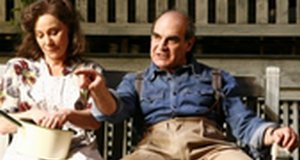SITE GUIDE
SEARCH
REVIEWS
REVIEW ARCHIVES
ADVERTISING AT CURTAINUP
FEATURES
NEWS
Etcetera and
Short Term Listings
LISTINGS
Broadway
Off-Broadway
NYC Restaurants
BOOKS and CDs
OTHER PLACES
Berkshires
London
California
New Jersey
DC
Connecticut
Philadelphia
Elsewhere
QUOTES
TKTS
PLAYWRIGHTS' ALBUMS
LETTERS TO EDITOR
FILM
LINKS
MISCELLANEOUS
Free Updates
Masthead
Writing for Us
A CurtainUp  London Review
London Review
 London Review
London ReviewAll My Sons
|
Every man does have a star. The star is one's honesty. And you spend your life groping for it, but once it's out it never lights again. — Chris
|

Zoë Wannamaker as Kate Keller and David Suchet as her husband Joe Keller (Photo: Nobby Clark) |
Completely re-cast, the production is all the stronger for the magnificently darkly brooding David Suchet as the complex and corrupt Joe Keller. Zoê Wannamaker plays Kate Keller, mother of a missing pilot who, three years after his disappearance, clings to the hope that he may be alive. Bringing the situation to a head is the arrival of Ann Deever (Jemima Rooper), Larry the missing son's, fiancée. The Deevers used to live next door to the Kellers. Ann is now being secretly courted by her dead fiancé's brother, Chris (Stephen Campbell Moore) and her father is in prison for his part, having taken the blame for releasing defective aircraft parts at the factory where he worked for Joe Keller.
As Miller's plays almost always are, All My Sons is a re-working of the disintegration of the American Dream, the opportunity to make it financially in the New World falling apart. The theme of All My Sons, the temptation to cover up a potential loss making exercise under financial pressure, is as patently present and relevant in 2010 as it was to the 1940s.
I found all the performances completely credible. Stephen Campbell Moore's thoughtful, dutiful Chris tied to the memory of his brother and frustrated by his mother's refusal to accept that everybody needs to move on. His choice, either to move away or to confront his parents, is clear. David Suchet, with his dark countenance, is very much the controlling pater familias with his dreadful secret, and yet he is not dislikeable. He is an affable, decent man who faced with a choice has made the wrong decision which has unknown and terrible consequences. His sin is compounded by the unnecessary deaths and the damage to the Deever family caused by the cover up, but these are just corporate consequences. The Furies will also strike home at the heart of his family. You can clearly see the parallels with Ibsen.
Zoë Wannamaker, steely and determinedly in denial, contrasting with her unruly hair which escapes from the pinned back style, opens the play with the symbolic device Howard Davies used ten years ago. During the thunderstorm, Kate wakes and comes into the garden and sees the trunk of the apple tree, which was planted for Larry, crack in two. If anyone believed in omens this would be it. As Kate recalls her dream we hear the roaring noise of aircraft engines behind the wind and storm. Her low groans when she reads the letter strike to the depths of a bottomless emotional chasm, a mother's love for her son.
The performance I found most divergent from that in 2000 is Jemima Rooper's Ann. She is peaches and cream, an all American, nervously smiling girl. This works but, unlike the performance given by Catherine McCormack, she seemed to me to be the sort of girl who would long ago have blurted out the contents of the letter from Larry or shared it with one of her girlfriends. Her hair and clothes are perfectly in period with her long film star waves curled under on her shoulders. The conviction that she has of her father's guilt and of Mr Keller's innocence can only reflect stupidity, or a misplaced loyalty to the Kellers rather than her own family.
This is a superb revival that after a decade testifies by retaining freshness and stimulating ideas.
For more about Arthur Miller, his work and links to other of his plays reviewed, see Curtainup's Arthur Miller Backgrounder
|
Subscribe to our FREE email updates with a note from editor Elyse Sommer about additions to the website -- with main page hot links to the latest features posted at our numerous locations. To subscribe,
E-mail: esommer@curtainup.comesommer@curtainup.com
put SUBSCRIBE CURTAINUP EMAIL UPDATE in the subject line and your full name and email address in the body of the message -- if you can spare a minute, tell us how you came to CurtainUp and from what part of the country. |
| All My Sons
Written by Arthur Miller Directed by Howard Davies Starring: David Suchet, Zoë Wannamaker, Stephen Campbell Moore With: Jemima Rooper, Stephen Elder, Tom Vaughan-Lawlor, Claire Hackett, Olivia Darnley, Ted Allpress/Tom Howard/Gabriel Steele, Daniel Lapaine Design: William Dudley Lighting: Mark Henderson Sound: Pail Groothuis Music: Dominic Muldowney Running time: Two hours 30 minutes with one interval Box Office: 0844 412 4658 Booking at the Apollo Theatre until 11th September 2010 Reviewed by Lizzie Loveridge based on 1st June 2010 performance at the Apollo Theatre, Shaftesbury Avenue, London W1V 7HD (Tube:Piccadilly Circus) |
|
REVIEW FEEDBACK Highlight one of the responses below and click "copy" or"CTRL+C"
Paste the highlighted text into the subject line (CTRL+ V): Feel free to add detailed comments in the body of the email . . . also the names and emails of any friends to whom you'd like us to forward a copy of this review. |
|
London Theatre Tickets Lion King Tickets Billy Elliot Tickets Mighty Boosh Tickets Mamma Mia Tickets We Will Rock You Tickets Theatre Tickets |




